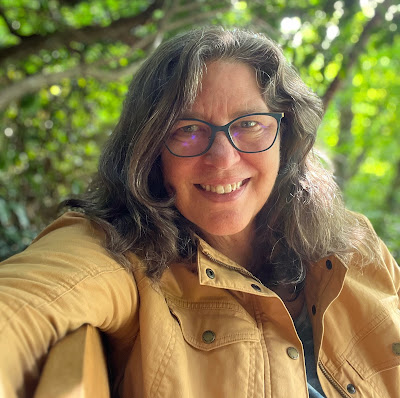Margot Lester, CEO and owner of The Word Factory marketing agency, recently completed her NC Environmental Education Certification. The Word Factory has been in operation for more than 30 years and provides messaging and strategy consulting and brand journalism services, corporate and individual writing training, and advocacy work for national brands, universities and nonprofits.
Margot is an avid woods walker and beach lover, stormwater
geek, interpretative signage nerd and nature writer. “My vocation and avocation
came together when I discovered I could teach what I know about communications,
writing and advocacy in the context of nature, the environment and climate
action. It's still kind of hard to believe how well they dovetail.”
When asked about her favorite part of the program, Margot
says she has met terrific people through the program and has made many friends.
She also “ really loved getting to visit parks and other facilities around the
state, like Singletary State Park and Gorges State Park. It not only fed my
interest in education and interpretation, but it deepened my connection to my
home state and its incredible natural resources.”
For her community partnership project, Margot created two
nature journaling posters and a set of prompts for the Triangle Land Conservancy’s
Williamson Preserve. One poster briefly reviews the benefits of being in nature
and invites visitors to refocus their eyes, tune their ears and look for repeating
patterns in nature. The other introduces visitors to Project Pando, a volunteer-driven farm that
grows native trees that will be given for free to the public. “The project
benefits public health by guiding visitors to slow down and immerse themselves
further into nature, which enhances the mental and physical health benefits of
being outside. The guided observations also create a connection to the
preserve, explaining its role in native tree restoration. The posters inspire
hikers who are curious about nature connection and journaling and may even
motivate people to hit the trail to explore these activities and discover a new
way to engage with the natural world.”
Margot says the certification program changed her approach
to teaching. She says that the workshops provided by Environmental Educators of
North Carolina (EENC) on inclusion, cultural sensitivity and accessibility really
influenced her teaching. “I now do a people and place acknowledgment before my
programs and include resources from a much more diverse group of experts. I
plan my outdoor sessions with mobility in mind and try to optimize my materials
for accessibility readers. I'm also exploring the possibility of translating my
advocacy, climate action and nature journaling content into Spanish.”
The certification had an impact on the way she views
environmental issues, too. “Interacting with people at events and trainings
made me realize the need for empathy and hope in our communications about
environmental and climate issues. Not toxic optimism or glossing over the real
issues but sharing the hard parts and then showing tangible acts -- big and
small -- that have impact. That's where the hope comes in. Doing my own work on
these two topics helped me see the vital role of storytelling and personal
narrative to break down barriers, bridge gaps and move people to action.”


No comments:
Post a Comment
Comments to this site are subject to the N.C. Public Records Law and may be disclosed to third parties. Please identify yourself in posts. Off-topic posts, "spam" or posts with offensive or inappropriate language will be removed.